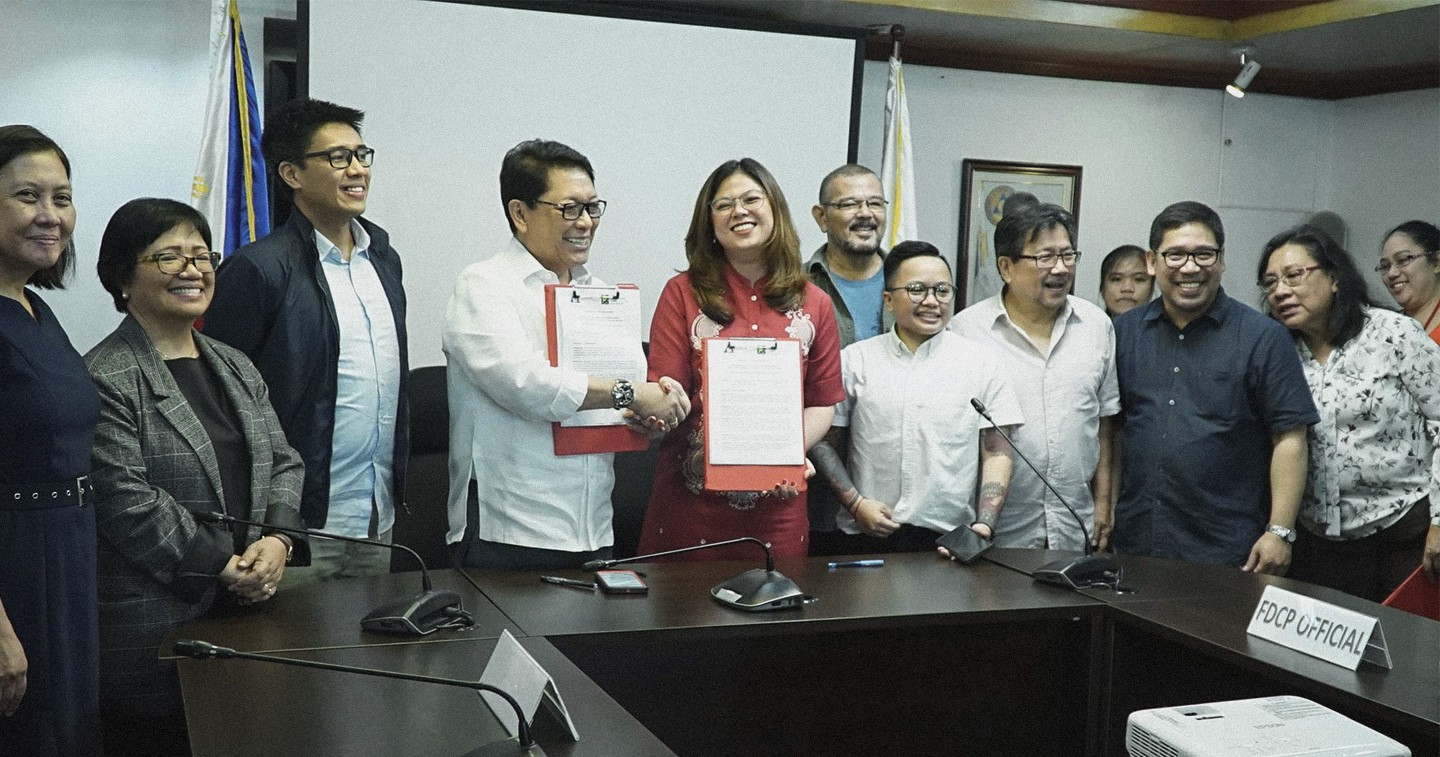MANILA, PHILIPPINES – Set working hours, social welfare benefits, and the “no contract, no work” policy for members of the audiovisual industry are just some of the improvements that will be implemented soon, thanks to the Joint Memorandum Circular (JMC) signed by the heads of the Department of Labor and Employment (DOLE) and Film Development Council of the Philippines (FDCP) on February 7, Friday.
DOLE Secretary Silvestre Bello III and FDCP Chairperson and CEO Liza Diño joined forces to formalize JMC No. 1, Series of 2020 on the guidelines governing the working conditions and occupational safety and health of workers in the audiovisual production. The JMC will take effect after 15 days following its complete publication in two national newspapers of general circulation, and its filing of three copies with the Office of the National Administrative Registrar (ONAR) at the University of the Philippines (UP) Law Center.
“We thank the FDCP for signing with us itong landmark agreement that will provide our people in the industry safe and wholesome workplaces para hindi na maulit ang nangyari kay Eddie Garcia,” remarked Bello during the historic signing at the OSEC Conference Room of the DOLE Building in Intramuros, Manila. Bello was referring to the unfortunate death of film and television icon Garcia, whom the labor secretary regarded as the greatest in the film industry. Garcia passed away on June 20, 2019 after suffering a neck injury while on the set, which caused him to fall into coma.
Diño, who agreed with Bello, noted that the groundwork for creating the JMC began even before the untimely death of Garcia. “But I would say malaking bagay talaga, unfortunate as it was, that it was through his death, pero parang nagising ang lahat,” she said. The FDCP Chair then regarded the JMC as a labor of love, particularly the love for the audiovisual industry. “Hindi po mabubuo ito kung wala lahat ng mga nagtulung-tulong. Kaya Sec. Bello at ang lahat ng nasa DOLE, maraming, maraming salamat,” she uttered.
Among those in attendance during the JMC signing were DOLE Undersecretary Ana Dione, DOLE Undersecretary Benjo Benavidez, DOLE Assistant Secretary Teresita Cucueco, FDCP FilmPhilippines Office Executive Director David Fabros, Katipunan ng mga Artistang Pilipino sa Pelikula at Telebisyon (KAPPT) or Actors Guild of the Philippines Member of the Board of Directors (Ex-Officio) Rez Cortez, former Film Academy of the Philippines (FAP) Director General Leo Martinez, and singer-songwriter-actor Ice Seguerra.
Attendees were emotional during the signing because finally, changes will happen to protect the rights of audiovisual filmmakers. Diño shared, “Today is very historic kasi the closest that we ever got to having this was a labor advisory. A labor advisory just enjoins or encourages but it never really sets rules. So ito, may karampatang penalties. Atsaka iba rin kasi ‘yung merong masasandalan ‘yung mga workers natin na patakaran para sa proteksyon nila.”
Many years in the making
The FDCP head went on to detail how the JMC came about. “Napakatagal po nang hinintay namin para po marating itong pagkakataong ito,” she began. “This day is not only the victory and joy of FDCP but ‘yung mga nandito ngayon na matagal na pong nagsulong nito. Gusto ko pong ibigay sa kanila ang pasasalamat dahil sila ang nag-umpisa nang pagsulong nitong guidelines para proteskyunan ang ating mga manggagawa. Sir Rez Cortez, Sir Leo Martinez, and the rest of the Actors Guild of the Philippines, lahat ng guilds, the Film Academy of the Philippines, maraming, maraming salamat po for your relentless efforts.”
She also thanked her husband, Seguerra, her policy team composed of Apple Barbero and Rachelle Villaluna, FDCP FilmPhilippines Office Executive Director Fabros and the FDCP National Registry Unit. “This is a historic moment for the film industry and the celebration of the One Hundred Years of Philippine Cinema. Napakalaking regalo po ito para sa aming mga manggagawa.” Cucueco of DOLE echoed, “This has been many years in the making. We have lobbied for this and it is now that we see the fruition of all of these efforts. All stakeholders have worked together so that the audiovisual industry will have the optimum working conditions, safety, and health for its workers.”
According to the JMC, the following general work guidelines on working conditions will be enforced:
- According to the JMC, the following general work guidelines on working conditions will be enforced:
- “No contract, no work” policy
- Working hours at a minimum of eight (8) hours and a maximum of sixteen (16) hours (in exceptional circumstances)
- Overtime pay to be given after the eighth hour at 25% of the hourly rate
- Additional premium pay on overtime performed during rest days, special days, and regular holidays
- Hours of work not exceeding 60 hours in a week
- Waiting time, pre-production, ocular work, and post-production to be considered as working time
- A turnaround time of 12 hours as the rest period between working days
- Provision of call sheets before every shoot
- 24-hour notice of cancellation of work
- Payment for workers’ contracted time if an engagement gets cancelled
- Memberships in the Social Security System (SSS), Home Development Mutual Fund (Pag-IBIG Fund), and Philippine Health Insurance Corporation (PhilHealth)
- Emergency health services and access to rehabilitation and compensation of work connected to illnesses and injuries affecting workers
- Provision of meals and sufficient amounts of coffee and safe drinking water
Adequate transportation facilities to locations or reimbursements of the workers’ transportation costs - Safe, adequate, and free accommodations on distant or overnight locations
With regards to occupational safety and health (OSH), the JMC states the following standards:
- Mandatory presence of OSH personnel
- Conduct of risk assessment and securing location permits
- Provision of safety equipment and first aid
- Creation of a safety and health committee
- Drafting of an emergency preparedness and response plan
- Adequate, clean, persons with disability (PWD)-friendly, and genderless toilet facilities
- Dressing rooms with comfort and privacy for each sex, with separate dressing rooms for children of each sex
- Covered and enclosed holding areas with adequate ventilation or air-conditioning with suitable emergency escapes for stunt people, background actors, and technical crew (on top of existing holding areas for producers, directors, and actors)
- Personal fall protection system for working at heights
- Minimum construction safety provisions
- Electrical installations to comply with Philippine Electrical Code
- Department of Transportation compliance of all equipment and vehicles
- Animal handling to be done by professional trainers and designated handlers
- Notification of the use of hazardous materials
- Usage of blank ammunition for firearms and weaponry
- Stunts to be performed by qualified workers only
- Presence of stunt/special effects coordinator in the filming of all stunt/special effects scenes
The JMC also has provisions on disallowing the cabo system and the prohibition of sexual harrassment. Meanwhile, it supports the workers’ rights to self-organization and collective bargaining. Workers’ issues on disciplinary measures, suspension, and termination will be dealt with by FDCP. If unresolved, it will be elevated to DOLE for the mandatory 30-day conciliation-mediation through the Single Entry Approach (SEnA).
Additionally, producers need to submit the reportorial requirements to DOLE and FDCP for the monitoring of their compliance. The producers’ compliance will be enforced by the DOLE Regional Office which has jurisdiction over the workplace in accordance with Article 128 of the Labor Code. Penalties for non-compliance with OSH standards will be dealt with in relation to Republic Act (RA) No. 11058 while other penalties for non-compliance will be imposed by FDCP in accordance with Section 15 of RA No. 9167.
The landmark signing of the JMC on the working conditions and OSH of audiovisual industry workers took place just four days after the February 3 Congress Committee Hearing on House Bill 181 for the proposed occupational safety and health standards (OSHA) act for the film, television, and theater industry of the Philippines. HB 181 is also known as the Eddie Garcia Act.
More Congress Committee Hearings on the Eddie Garcia Act are set to take place, prompting Diño to comment, “What’s important about the signing and implementation of the JMC is that it will already serve as a jumping point for the eventual legislation that we are pushing for in Congress. Especially now that a technical working group has been formed to finetune the provisions of the Eddie Garcia Act and discuss crucial details that could help them craft law for the audiovisual industry, we will continue with our efforts and coordination.
In the last two years, negotiations have been taking place among the respective agencies in charge of these concerns. Consultative meetings, tripartite negotiations, research of best practices by other countries – lahat ito binuno ng mga taong naghirap para sa JMC and it is only fair to acknowledge the work that has been done by these institutions. From DOLE, FDCP, Movie Workers Welfare Foundation (Mowelfund), and the other guilds – they have all devoted their time and dedication towards the realization of this policy that would protect the welfare of our audiovisual workers.”








